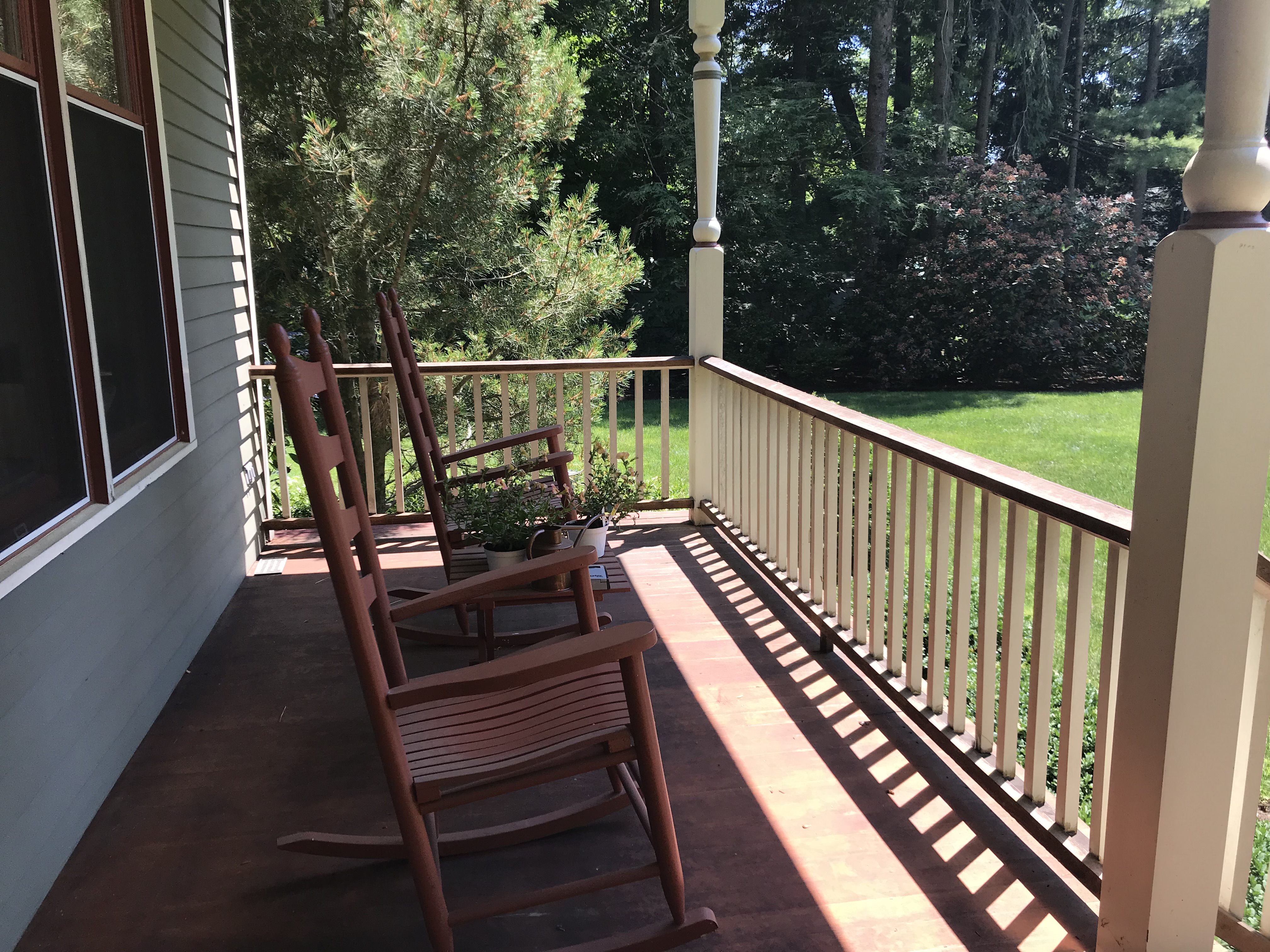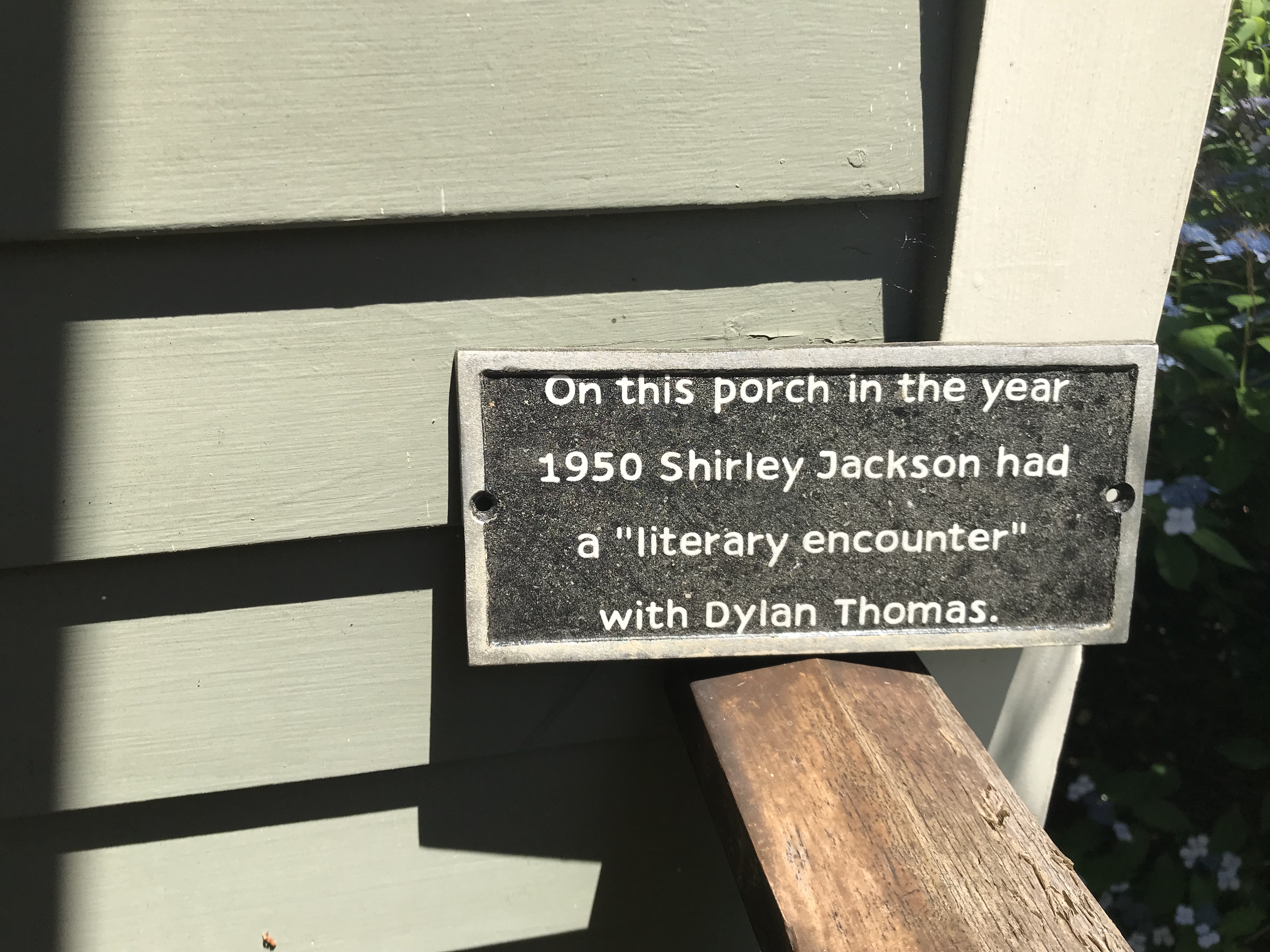My Niece Is Probably the Reincarnation of Shirley Jackson
CJ Hauser on Motherhood and The Haunting of Hill House
My sister has made it very clear she would like me to stop insinuating that her baby is the reincarnation of Shirley Jackson. But listen:
SOME REASONS WHY MY NIECE IS PROBABLY THE REINCARNATION OF SHIRLEY JACKSON
My niece is eight months old. She was born into Shirley Jackson’s old house in Westport, Connecticut, which my sister and brother-in-law bought when they wanted to start a family. Do you know who Shirley Jackson is? I’m sure you do, but if not, what I need you to know is that Shirley Jackson was an author who most famously wrote about two things: 1) children 2) haunted houses.
My sister and brother-in-law claim the name Theodora just “came to them,” but when I think of the name Theodora, I think of Theodora Crain, arguably the most badass character in Jackson’s most famous novel, The Haunting of Hill House. Jackson gives Theodora all the best lines (“Whose hand was I holding?”) and all of the most daring moves. So if you were the ghost of Shirley Jackson and intended to be reborn, if a lady got pregnant in your old house, wouldn’t the name you once gave your coolest character be the name you gave yourself?
If you were me, wouldn’t you look into my niece’s endless black eyes and fat, knowing face, and wonder?
If you can, imagine the look on my beautiful, exhausted sister’s face when, an hour after giving birth, I arrived in her hospital room and declared this theory out loud.
No, she said.
Hello tiny Shirley, I whispered to the perfect changeling in the plexiglass bassinet.
*
Eleanor looked up, surprised; the little girl was sliding back in her chair, sullenly refusing her milk… ‘Her little cup,’ the mother was explaining, … ‘It has stars in the bottom, and she always drinks her milk from it at home… You’ll have your milk from your cup of stars tonight when we get home. But just for now, just to be a very good little girl, will you take a little milk from this glass?’
Don’t do it, Eleanor told the little girl; insist on your cup of stars; once they have trapped you into being like everyone else you will never see your cup of stars again…the little girl…smiled a little subtle, dimpling, wholly comprehending smile, and shook her head stubbornly at the glass.
Brave girl, Eleanor thought; wise, brave girl.
–Shirley Jackson, The Haunting of Hill House
The house in The Haunting of Hill House is haunted because of what’s gone wrong between Eleanor and her mother. The book figures the feminine care that passes between daughter and mother as a kind of ourobouros succubus. Mothers caring for children, children caring for mothers, both winding up alone and with nothing more to give.
This is how a Jackson house becomes haunted. It becomes a physical representation of the domestic sphere where care lives. A house carries inside it the power of women’s disappointment and anger and fear and violence.
During her life, Jackson was celebrated for her work, but she was seen primarily as a genre writer—a horror writer. Shirley Jackson wrote about haunted houses, in part, because the house was the structure that held, and embodied, the domestic life. It wasn’t until later that readers and critics came to recognize Jackson’s haunted house as an unreal trope that could communicate the emotional reality of female care and motherhood in 1959. What does it mean for the structure of your life to feel menacing? To be imprisoned within it? To feel like it might kill you?
Jackson asks us: how could a mother and daughter possibly live in a house and avoid its becoming haunted?
*
No live organism can continue for long to exist sanely under conditions of absolute reality; even larks and katydids are supposed, by some, to dream.
–Shirley Jackson, The Haunting of Hill House
When my sister and brother in law returned from the west coast to Westport, Connecticut to start a family, they wanted a modern house. Everything they own is stylishly smooth and/or crisply well tailored. So when they told me they were buying an oddball historic Victorian with a legitimate turret and a wraparound porch I was surprised. But they’d fallen in love with the place.
If Shirley Jackson’s spirit had returned to this house, in the form of my niece, was it because she was haunting the place, or because she’d been happy there?Jackson’s time in the “Indian Hill House,” as it came to be called, was brief, but eventful. Jackson and her husband, Stanley Edgar Hyman, a critic at the New Yorker, lived in Westport with their four children from 1949, just after “The Lottery” was published, until just after 1950, when their eight-year-old son Laurence was hit by a car and injured, just beyond the driveway of the home, while riding his bike. After the accident, the Jackson-Hymans sued the city of Westport. According to Judy Oppenheimer, one of Jackson’s biographers, the accident “turned Shirley against Westport for good,” and the family returned to Vermont not long after.
But it wasn’t all bad. Jackson loved motherhood, according to later biographer Ruth Franklin, and the house was sprawling and had room for the family of six and the rotating cast of visitors who stayed there. The family hosted Ralph Ellison, who purportedly completed Invisible Man in the house’s third story turret—this is now Theodora’s reading nook. JD Salinger (who it seems was only ever called a recluse by people who never visited Connecticut in those years) is said to have played catch with the Jackson boys out front—from Theodora’s nursery window you can see the even-green of neatly mowed lawn between the hedgerows.
The Jackson-Hymans were a literary power couple. They hosted parties on the Indian Hill House’s enormous wraparound porch and among the attendees was the poet Dylan Thomas. Oppenheimer writes that after “liquor and smoke and endless rhetoric,” Jackson and Thomas “met alone outside on the enormous porch that wound around the house…[Jackson] confided to me that, yes, she was one of those women Dylan Thomas screwed on the back porch.” These days, hanging on the porch, is a fake historical placard. It was created, in the same style as the authentic placard on the front porch from the Westport Historical Society, by my mischievous uncle. His false placard reads: “In 1949 Shirley Jackson had a literary encounter with Dylan Thomas on this porch.” My sister keeps rocking chair on that porch and sometimes sits in it to feed the baby.


These days, Jackson’s house is the place where my sister is making her family. And when I visit my sister there, I can’t stop myself from wondering: if Shirley Jackson’s spirit had returned to this house, in the form of my niece, was it because she was haunting the place, or because she’d been happy there?
I must admit that, at first, the Indian Hill House made me afraid.
*
We moved together very slowly toward the house, trying to understand its ugliness and ruin and shame.
–Shirley Jackson, We Have Always Lived in the Castle
I wasn’t afraid because I thought the house was haunted. And I wasn’t afraid my sister would be unhappy in the house either. She and my brother-in-law are beautiful, hilarious people who have made a beautiful, hilarious baby.
I was afraid because, like so many writers, I am a narcissist, and so I was worried about what this all meant for me.
The Haunting of Hill House has never been my favorite Jackson. Jackson’s book I most love is We Have Always Lived in the Castle, which is a haunted house from a different angle: one to do with sisters. The Blackwood sisters’ family has been murdered over dinner, save the two of them and an elderly uncle who survived the poisoned sugarbowl. In the aftermath of the murders, Merricat and Constance live alone inside their family home, the “castle” of the title. They live together because they love each other. Merricat is particularly and ravenously in love with Constance, and Constance, for her part, cares for Merricat despite her being strange and feral. They live together because they have seen horrors in their family that only the other understands (the murders, but also one can read between the lines of Merricat’s relationship with her father and see the specter of abuse). Who, from outside, beyond the castle walls, could understand these things? Their isolated feminine happiness is threatened when a man comes to romance Constance. Love is what splits the sisters’ affections for each other. A man is what ruins their odd domestic paradise. Things go off the rails once he moves in as Merricat desperately tries to find a way to drive him out of her sister’s affections and their home.
A castle can be a structure that isolates and imprisons you, but can also be a kind of protection from having to face people who don’t understand the nature of your trauma—the way in which your house came to be haunted.In the end, the man is removed and the sisters literally barricade the house against him, and their neighbors. They lock their doors. They live alone, together again, walled inside their castle.
I wonder if I am the only reader who cheers when they do this. Who thinks that, as Shirley Jackson stories go, this amounts to a kind of happy ending.
The way I read it, the Blackwoods’ house shows us that a castle can be a structure that isolates and imprisons you, but can also be a kind of protection from having to face people who don’t understand the nature of your trauma—the way in which your house came to be haunted.
When my sister got married and moved into Shirley Jackson’s house and had a baby there was a part of me who felt: but we are the ones who have lived in the castle. Who feared that she would now live behind walls with her new, lovely family and I would be a strange little Merricat left out in the cold remembering our sadnesses alone.
*
“Fear,” the doctor said, “is the relinquishment of logic, the willing relinquishing of reasonable patterns. We yield to it or we fight it, but we cannot meet it halfway.”
–Shirley Jackson, The Haunting of Hill House
The week my sister brought her baby home I realized how wrong I was. “My boobs are about to be out,” she said, and settled into a cushioned rocker. She looked like a glowy renaissance painting of motherhood even as a string of profanity and shushes and opinions came out of her mouth. “Could you wash this and bring me a new one?” She said, handing me a nipple shield. “Here, I’ve got it,” my brother-in-law said.
I could have cried I was so happy. I was still inside the castle.
When my sister went back to work and my brother-in-law took over daytime parenting, I moved in for a week to help. I have always held that I won the brother-in-law lottery; he is one of my favorite people. We changed diapers and bounced Theodora and discussed whatever debacle was on CNN that moment and our favorite adult cartoons. It was a lovely, quiet week. After I left, he told my sister I could pop in and out like family—I didn’t need to be invited over like a guest.
And so now I linger in my sister’s house whenever I can. I make food in the kitchen. I taunt the dog. I squeeze the baby. I ask about the state of affairs vis-à-vis nipples. Even now, I feel like a weird little vampire who has been lucky enough to be invited over the threshold. I don’t know why I so feared I wouldn’t be.
Or I do. Because of the stories I have read. Stories that tell us that families must be protected from outsiders with walls and secrets. Stories that describe motherhood, especially, as a walled place.
I think the reason I want my niece to be Shirley Jackson so badly is because I want to believe that women, especially mothers, don’t need stories about haunted houses anymore. That we are less trapped by the domestic and less silent about what goes on inside our walls. I want to believe that we can find a new governing metaphor. And I know this isn’t quite true, or that it isn’t true yet, but maybe we are just close enough in range to such a time to know to hope for it. After all, here is my sister, living in Shirley Jackson’s house, in an unwalled state of motherhood.
I want my niece to be Shirley Jackson so she can see that.
I read Theodora stories in the turret where Ellison finished Invisible Man. I roll a plastic ball to her on the lawn where Salinger once played catch. I sit with her in a rocking chair on the porch where Jackson wooed Dylan Thomas. From that porch, we can look behind us, and see her house, but we can also look out and see cups of stars above the lawn and cups of stars above the unlocked garden gate.
________________________________________

Family of Origin by CJ Hauser is out now via Doubleday.




















